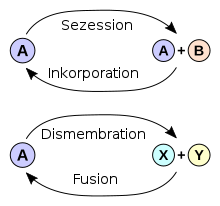Merger (international law)

A merger (also amalgamation or amalgamation ) is the amalgamation of states that give up their previous statehood. In principle, it takes place between equal partners who together form a new state.
Demarcation
The merger differs from the incorporation , in which one subject under international law joins another whose identity under international law is not affected. In contrast to the incorporation, a new subject of international law is created, which is not legally identical to any of its predecessor states and, according to the formulation of international lawyer Max Huber , has "an extinct effect" on all states involved. Merger and incorporation are generally peaceful. A violent connection of a state to another is called annexation . The opposite term to fusion is dismembration , in which a state in toto splits up into two or more new states and then no longer exists. If only one territory breaks away from a state, but it persists, one speaks of a secession .
There is no merger in the case of a personal union if the same ruler acts as head of state in different territories, but which retain their statehood. Joining a confederation or transferring sovereign rights to a supranational organization is not a merger either. However, the transitions are fluid.
Historical examples
In the 18th century, the 13 colonies that had seceded from Great Britain on July 4, 1776 , merged to form the United States of America . Its confederate constitution, the Articles of Confederation of 1781, was superseded by the United States Constitution , which came into force in 1789.
In the 19th century, several federal states in Europe were created through mergers. Mention should be made of Switzerland and, in the second half of the century, the North German Confederation (1867). Furthermore, whether the German Reich by the November contracts in 1870 in a merger established was that opinions differ.
In the 20th century, the United Arab Emirates came into being in 1971 through the merger of seven sheikdoms . In 1963/64 Tanganyika and Zanzibar merged to form the United Republic of Tanzania . The merger of the People's Democratic Republic of Yemen and the Yemeni Arab Republic to form the Republic of Yemen in 1990 also took place on the path of merger.
In 1990 it was discussed whether the reunification of Germany should be carried out through Article 23 of the Basic Law for the Federal Republic of Germany as the GDR's accession to the Federal Republic or through Article 146 of the Basic Law . This would have meant a merger, ie “a merger of the two states into a new state subject”. It was decided in favor of Art. 23 GG and the incorporation.
Individual evidence
- ↑ Oliver Dörr: The incorporation as an offense of state succession . Duncker & Humblot, Berlin 1995, p. 132 .
- ↑ a b Burkhard Schöbener : State Succession. In: the same (ed.): Völkerrecht. Lexicon of central terms and topics . CF Müller, Heidelberg 2013, p. 414.
- ↑ Georg Dahm / Jost Delbrück / Rüdiger Wolfrum : Völkerrecht , Vol. I / 1: The basics. Die Völkerrechtssubjekte , 2nd edition, de Gruyter, Berlin 1989, ISBN 978-3-11-090077-4 , p. 154, note 11 (accessed via De Gruyter Online).
- ^ A b Georg Dahm / Jost Delbrück / Rüdiger Wolfrum: Völkerrecht , Vol. I / 1: The basics. Die Völkerrechtssubjekte , 2nd edition, de Gruyter, Berlin 1989, p. 155 (accessed via De Gruyter Online).
- ↑ Take a merger to Georg Dahm / Jost Delbrück / Rüdiger Wolfrum: Völkerrecht , Vol. I / 1: The basics. The subjects of international law , 2nd edition, de Gruyter, Berlin 1989, p. 155, and Marcel Kau: The state and the individual as subjects of international law . In: Wolfgang Graf Vitzthum and Alexander Proelß (eds.): Völkerrecht . 7th edition, de Gruyter, Berlin / Boston 2016, ISBN 978-3-11-044130-7 , p. 197, Rn. 175 (both accessed via De Gruyter Online); clearly rejecting this Michael Kotulla : Deutsche Verfassungsgeschichte. From the Old Reich to Weimar (1495–1934) . Springer, Berlin 2008, p. 526; Michael Silagi: End of State and State Succession with Special Consideration of the End of the GDR (= writings on international and public law , vol. 11), Peter Lang, Frankfurt am Main 1996, ISBN 978-3-631-49575-9 , p. 170 ; Christian Heitsch: The execution of the federal laws by the states , Mohr Siebeck, Tübingen 2001, ISBN 3-16-147645-X , p. 60 Note 153. According to Oliver Dörr: The incorporation as an offense of the state succession . Duncker & Humblot, Berlin 1995, pp. 266–271 offer “overall […] domestic and international law practice an ambiguous picture”, but he recognizes a slight preponderance for the perspective of incorporation under international law, “especially since it is predominantly found in German political science prevailed. "
- ^ Andreas von Arnauld : Völkerrecht . CF Müller, Heidelberg 2014, p. 42, Rn. 100.
- ^ Josef Isensee : State unity and constitutional continuity . In: the same, Jochen Abraham Frowein et al: Germany's current constitutional situation Reports and discussions at the special meeting of the Association of German Constitutional Law Teachers in Berlin on April 27, 1990 . Walter de Gruyter, Berlin / New York 1989, ISBN 978-3-11-089493-6 , p. 40-64, here p. 46 f. (accessed via De Gruyter Online)